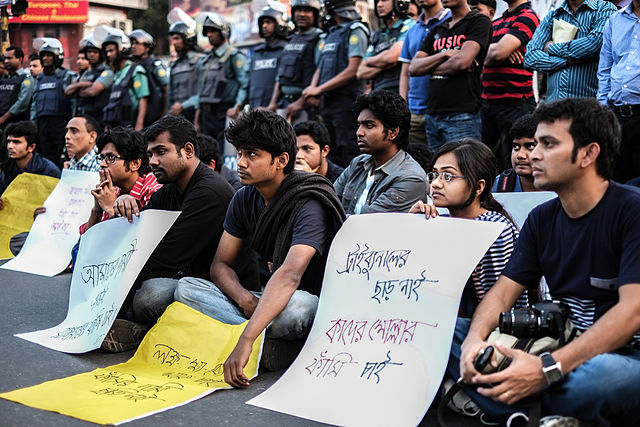It has been a turbulent year for Bangladesh. In early February, a leader of Jamaat-e-Islami, Bangladesh’s largest Islamist party, was convicted of rape and mass murder committed during the country’s 1971 war of independence from Pakistan. He was sentenced to life in prison.
But in Bangladesh, this doesn’t mean much — impunity is endemic in the country, and in cases involving prominent political leaders, even a life sentence can be shortened to just a few years with relative ease. Thus the court’s verdict sparked months of mass protests, now known as the Shahbag movement, that called for the death penalty (incontrovertible for sure) for all those convicted of atrocities during the war of independence. Later that month, a different Jamaat-e-Islami leader did receive a death sentence, causing Islamist supporters of the party to attack police, minorities, and Hindu temples across the country.
Unrest between religious fundamentalists and the country’s Hindu and secular minorities continued to simmer throughout the spring. In May, political bloggers writing in support of the movement faced threats both from Islamist party members and government authorities alike — four were detained for their writings, and one was hacked to death in the street by angry counter demonstrators.
International attention has now turned back toward Bangladesh with the recent arrest of human rights lawyer Adilur Rahman Khan. Khan, a former deputy attorney general in Bangladesh, arrived at his home on the night of August 10 to find nine plainclothes police officers waiting for him. Khan was arrested without a warrant, allegedly for helping his employer, the human rights group Odhikar, to publish a report on police abuse.
Founded in 1994, Odhikar describes its mission as aiming to promote “human rights through awareness building, documentation, fact finding, monitoring and research,” among other related activities.
After being detained, Khan was charged under Section 57 of the Information and Communication Technology Act of 2006 for “publishing false images and information” and for the “disruption [of] law and order.” The investigating officer of the case said “Khan confused the government and people of the country through publishing contradictory a report on Odhikar website.”
The report—released by Odhikar on June 10—discussed the aggressive and fatal police response to a rally by a movement of conservative teachers and students known as Hefazat-e-Islam (Protectors of Islam) on the night of May 5 in Dhaka, Bangladesh’s capital. But the report has raised controversy in the country. Some have accused Odhikar of advocating for Jamaat-E-Islami causes without proper evidence.
In an opinion piece on BDNews24, North South University economist ABM Nasir wrote:
[The report] claimed 61 Hifazat activists died in the law enforcement operation aiming to evict the Taliban like Hifazat-i Islami from bustling Motjheel area of Dhaka on May 6, 2013. But, when approached, Odhikar initially could provide the account of only three deaths. Later, the organisation refused to provide any further discloser citing security reasons. The refusal led to the arrest of Adilur Khan.[…]Adilur Khan seems to change his position as political wind shifts. When he was a lawman of the country, he condoned the atrocities against his opposition. Now, out of power, he clads in humane garb, proclaiming himself as the champion of human rights.
Other responses were similarly scrutinizing, suggesting that Odhikar was mainly a defender of rights and protections for certain religious groups, rather than for the country's population as a whole.
On August 11, Khan was brought before the Chief Metropolitan Magistrate Court, where the public prosecutor asked for a ten-day remand against him, while Khan’s lawyer argued for his client’s release on bail. The judge, Amit Kumar Dey, rejected the bail petition and placed Khan on a five-day remand for interrogation. That same day, Odhikar offices were searched by detective branch police, who seized three laptops and two desktops from the location. The following day a division of the Supreme Court of Bangladesh stayed Khan’s five-day remand order and asked police to send him to jail for an indefinite period of time.
Western human rights groups have rallied to defend Khan, a move that has generated sharp criticism from leaders in Bangladesh. While Khan's actions and the Odhikar report deserve public scrutiny, his arrest does not help the cause of free expression, online and off, nor does it help the fight of bloggers who have long demanded justice for the country's genocide.
This post was amended with new information shortly after its publication.
To learn more about the Shahbag Movement, see Global Voices’ Special Coverage of the demonstrations.




